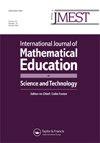纸质和数字环境中的任务:一项探索性质的研究
IF 0.6
Q3 EDUCATION & EDUCATIONAL RESEARCH
International Journal of Mathematical Education in Science and Technology
Pub Date : 2023-10-26
DOI:10.1080/0020739x.2023.2268613
引用次数: 0
摘要
摘要数字技术在教学和学习过程中的应用为数学教育开辟了广阔的新领域。教育研究转向21世纪技能的教与学(和评估),而计算机测试似乎是评估这些技能的一种有趣的可能性。从这个角度来看,比较计算机测试和纸笔测试是教育界的一个重要问题。它可以让我们更好地理解经典评估策略和方法的差异、创新和弱点。本研究的目的是通过对任务和学生解决过程的定性分析,提供一个在将任务从一个环境迁移到另一个环境时可以发现的差异的例子。本研究涉及的样本包括六年级和八年级的学生。分析表明,环境迁移过程不是中性的:任务存在差异。学生在任务中的表现是相同的,但在解决过程中可以观察到差异。特别是,我们样本中的学生在应用的数学资源和评估过程中有所不同。此外,随着学生对任务和环境的熟悉,他们似乎也会激活类似的解决问题的过程。关键词:计算机评估比较研究定性分析模式效果披露声明作者未报告潜在利益冲突注1 https://timssandpirls.bc.edu/timss2023/frameworks/pdf/T23_Frameworks_Ch1_Mathematics.pdf2 https://research.ncl.ac.uk/fasmed/本文章由计算机程序翻译,如有差异,请以英文原文为准。
Tasks in paper and digital environments: an exploratory qualitative study
AbstractThe use of digital technologies in teaching and learning processes has opened new and wide frontiers in mathematics education. Research in education moves towards teaching and learning (and assessing) twenty-first-century skills and computer-based testing seems an interesting possibility for assessing such skills. From this perspective, comparing computer-based with paper and pencil testing is an important issue for the educational community. It could allow us to better understand differences, innovations and weaknesses of classical assessing strategies and methods. The purpose of this study is to provide an example of the differences that can be found in migrating a task from one environment to another through a qualitative analysis of task and students’ solution processes. The sample involved in this study includes grade 6 and 8 students. The analysis shows that the environment migration process is not neutral: the tasks present differences. Students’ performances in the tasks are the same, but differences can be observed in solving processes. In particular, students of our sample differ in the mathematical resources applied, and in the assessing processes. In addition, it seems that students activate similar problem-solving processes as they become more familiar with the task and the environment in which it is administered.KEYWORDS: Computer-based assessmentcomparative studyqualitative analysistest mode effect Disclosure statementNo potential conflict of interest was reported by the author.Notes1 https://timssandpirls.bc.edu/timss2023/frameworks/pdf/T23_Frameworks_Ch1_Mathematics.pdf2 https://research.ncl.ac.uk/fasmed/
求助全文
通过发布文献求助,成功后即可免费获取论文全文。
去求助
来源期刊

International Journal of Mathematical Education in Science and Technology
EDUCATION & EDUCATIONAL RESEARCH-
CiteScore
3.30
自引率
11.10%
发文量
123
期刊介绍:
Mathematics is pervading every study and technique in our modern world, bringing ever more sharply into focus the responsibilities laid upon those whose task it is to teach it. Most prominent among these is the difficulty of presenting an interdisciplinary approach so that one professional group may benefit from the experience of others. The International Journal of Mathematical Education in Science and Technology provides a medium by which a wide range of experience in mathematical education can be presented, assimilated and eventually adapted to everyday needs in schools, colleges, polytechnics, universities, industry and commerce. Contributions will be welcomed from lecturers, teachers and users of mathematics at all levels on the contents of syllabuses and methods of presentation.
 求助内容:
求助内容: 应助结果提醒方式:
应助结果提醒方式:


